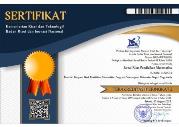The Effect of Mathematical Problem-Solving Ability and Mathematics Self-Concept on Learning Achievement
DOI:
https://doi.org/10.21831/jrpm.v11i1.73046Keywords:
Direct effect, indirect effect, mathematical problem-solving ability, mathematics self-concept, structural equation modelingAbstract
Several studies generalized that mathematical problem-solving ability, mathematics self-concept, and learning achievement were interconnected. This research investigated the direct effect of mathematical problem-solving ability on learning achievement, the direct effect of mathematics self-concept on learning achievement and mathematical problem-solving ability, as well as the indirect effect of mathematics self-concept on learning achievement through mathematical problem-solving ability. A total of 449 eighth-grade students from 12 public high schools in Yogyakarta were selected using proportional stratified random sampling. Mathematical problem-solving data was collected through a test, whereas mathematics self-concept data was collected through questionnaires. In addition, learning achievement data was collected from mathematics scores on mid-semester examinations. Descriptive statistics and structural equation modeling were used to analyze the data. This research concludes that (1) mathematical problem-solving ability, mathematics self-concept, and learning achievement are categorized as moderate, (2) mathematics self-concept has a significant direct effect on learning achievement but has no significant direct effect on mathematical problem-solving ability, (3) mathematical problem-solving ability has a significant direct effect on learning achievement, and (4) there is no significant indirect effect of mathematics self-concept on learning achievement through mathematical problem-solving abilities.
Downloads
Published
How to Cite
Issue
Section
License

Jurnal Riset Pendidikan Matematika by http://journal.uny.ac.id/index.php/jrpm/index is licensed under a Creative Commons Attribution-ShareAlike 4.0 International License.








